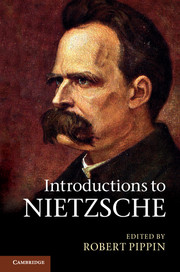Book contents
- Frontmatter
- Contents
- Note to the reader
- Chronology of Nietzsche's life and works
- Introduction
- Chapter 1 Nietzsche: Writings from the early notebooks
- Chapter 2 Nietzsche: The Birth of Tragedy
- Chapter 3 Nietzsche: Untimely Meditations
- Chapter 4 Nietzsche: Human, All Too Human
- Chapter 5 Nietzsche: Daybreak
- Chapter 6 Nietzsche: The Gay Science
- Chapter 7 Nietzsche: Thus Spoke Zarathustra
- Chapter 8 Nietzsche: Beyond Good and Evil
- Chapter 9 Nietzsche: On the Genealogy of Morality
- Chapter 10 Nietzsche: The Anti-Christ, Ecce Homo, Twilight of the Idols
- Chapter 11 Nietzsche: Writings from the late notebooks
- Select bibliography
- Index
- References
Chapter 3 - Nietzsche: Untimely Meditations
Published online by Cambridge University Press: 05 June 2012
- Frontmatter
- Contents
- Note to the reader
- Chronology of Nietzsche's life and works
- Introduction
- Chapter 1 Nietzsche: Writings from the early notebooks
- Chapter 2 Nietzsche: The Birth of Tragedy
- Chapter 3 Nietzsche: Untimely Meditations
- Chapter 4 Nietzsche: Human, All Too Human
- Chapter 5 Nietzsche: Daybreak
- Chapter 6 Nietzsche: The Gay Science
- Chapter 7 Nietzsche: Thus Spoke Zarathustra
- Chapter 8 Nietzsche: Beyond Good and Evil
- Chapter 9 Nietzsche: On the Genealogy of Morality
- Chapter 10 Nietzsche: The Anti-Christ, Ecce Homo, Twilight of the Idols
- Chapter 11 Nietzsche: Writings from the late notebooks
- Select bibliography
- Index
- References
Summary
Individually and collectively, the four ‘untimely meditations’ are unquestionably among Nietzsche's most widely neglected works. Published between 1873 and 1876, they seem to lack both the dramatic originality of the work that preceded them (The Birth of Tragedy) and the epigrammatic brilliance of the book that followed (Human, All Too Human). Their ostens-ible subjects are so diverse – David Strauss, the study of history, Arthur Schopenhauer and Richard Wagner – that they seem to be connected by little beyond their collective title and common form: namely, that of the traditional polemical essay divided into numbered, untitled sections.
Upon closer examination, however, they reveal a thematic unity that is not always obvious at first. The Untimely Meditations contain important, early discussions of such essential ‘Nietzschean’ subjects as the relationship between life, art and philosophy; the character and cultivation of the ‘true self’; education (and its vital erotic dimension), and the difference between genuine wisdom and mere knowledge (or ‘science’). Moreover, these four short works – especially the last two – always retained a special, deeply personal significance for their author, who considered them to be key documents for understanding his development as a philosopher. They are not, admittedly, as immediately accessible as many of Nietzsche's other writings, largely because of the way in which the Untimely Meditations are related to specific events, authors, and intellectual and cultural movements of his own era. The following remarks do not give even a preliminary analysis of the philosophical substance or content of these works; instead, they aim to provide readers with some understanding of the specific context within which Nietzsche conceived the project of the Untimely Meditations and with an appreciation of its significance within the larger context of his thought and development.
Keywords
- Type
- Chapter
- Information
- Introductions to Nietzsche , pp. 67 - 90Publisher: Cambridge University PressPrint publication year: 2012
References
- 1
- Cited by

